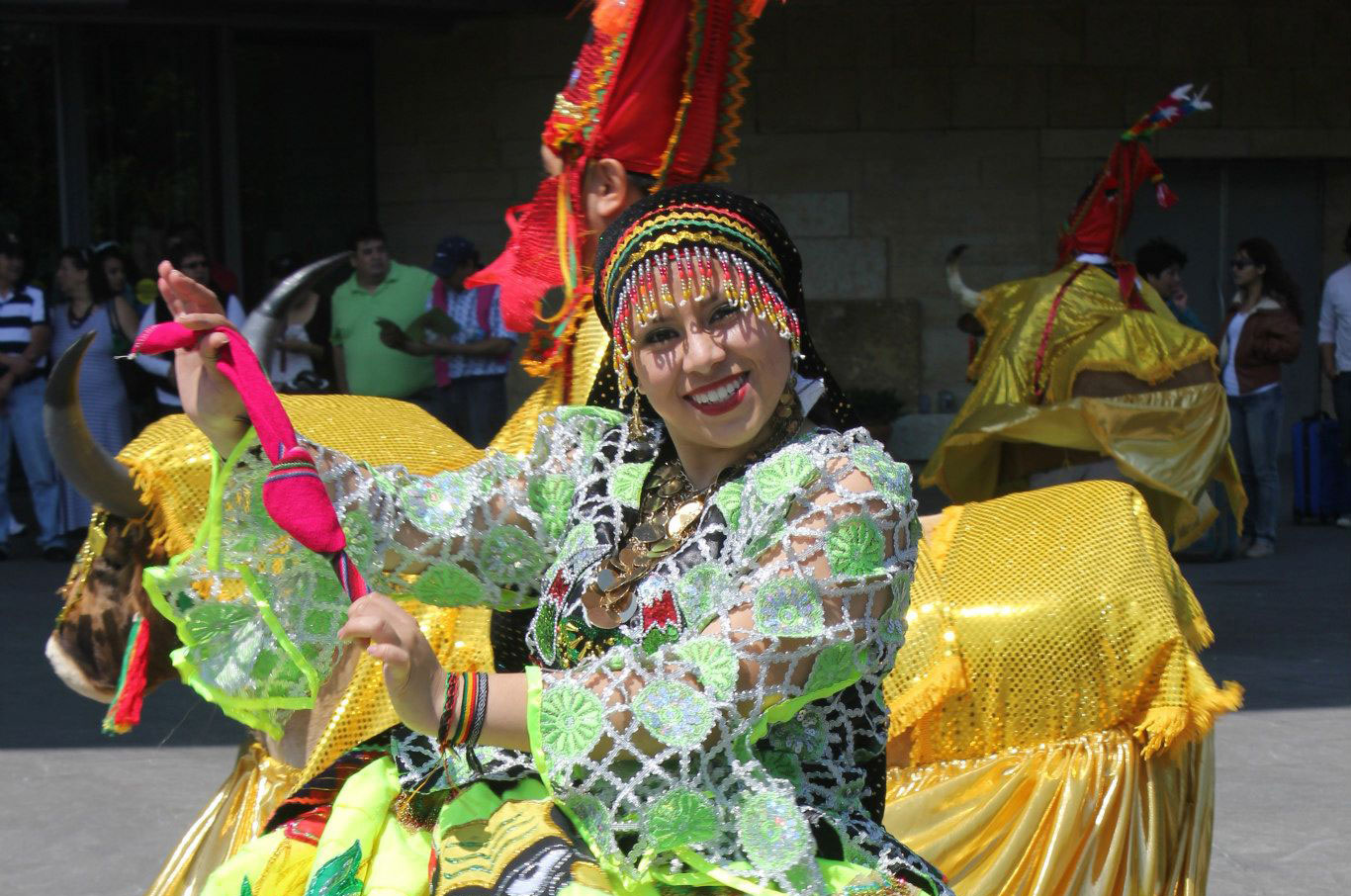National Museum of the American Indian Celebrates Bolivian Culture
The Smithsonian’s National Museum of the American Indian invites visitors to experience Bolivian culture, history and heritage during the Suma Qamaña Festival through music and dance performances, artisan demonstrations, film, hands-on activities, food and an art market, Thursday, June 5, through Sunday, June 8, 10 a.m. to 5 p.m. daily. Suma Qamaña means “living well” in the Aymara language. This festival is presented with the Embassy of the Plurinational State of Bolivia.
Dance Performances
More than 25 dance groups will perform at the museum’s Welcome Plaza and in the Potomac Atrium, with some groups made up of 30 to 40 dancers. Dance styles will range from traditional Suri Sicuri to the contemporary Vidanza dance troupe, Caporales and Tinku dances, which are seen in parades and during festivals. Groups include Muyu Muyus Dance Troupe, Sangre Boliviana, Morenada Central, Somos Bolivia, Fundacion Socio-Cultural Bolivia, Raices de Bolivia, Tinkus Tiataco and Ruphay.
Artisans
Each day an art market featuring nine Bolivian artists and vendors will be set up in the Potomac Atrium, including famed Bolivian painter, Roberto Mamani Mamani. Items such as Bolivian tea, salt, estevia (sweetener), quinoa products, freeze-dried potatoes, chocolate, original artworks, totora reed paper and clothing made from the soft wool of alpacas will be available for purchase. Those interested in visiting Bolivia can talk with tourism staff.
Family Activities
Visitors can learn about and play Bolivian games like “El sapo (the frog),” which is a game of skill where tokens are thrown into multiple targets such as a frog’s mouth and earn points. Kids will hear songs sung in rounds that rhyme in the imagiNATIONS Activity Center. A Bolivian storyteller will relate children’s stories about life in Bolivia. Families can learn more about Bolivian wind instruments, including the quena, a traditional Andes flute, zampoñas, Andean panpipes, pinquillo, a smaller flute and some percussion instruments.
Dinner & A Movie
On Saturday, June 7, at 7 p.m. there will be a special screening of The Gift of Pachamama (El Regalo de la Pachamama) (2008, 102 min). Directed by Toshifumi Matsushita, this film is a spiritual docudrama set in Bolivia, where a 13-year-old boy lives a traditional life with his family near Uyuni, a salt lake. With blocks of salt strapped to their herd of llamas, they travel “The Salt Trail” for several months, exchanging salt for other products of the Andes. From their many experiences and encounters, the boy begins to learn who he is as a young man and a Quechua. By the end, he discovers what his grandfather means by “the gift of Pachamama.”
Cuisine from the museum’s Zagat-rated Mitsitam Native Foods Cafe will be available for purchase beginning at 5:45 p.m. Seats in the theater are limited; the public may register here.
Food and Beverage Demonstrations
A menu of Bolivian foods will be available for purchase in the Mitsitam Cafe. Items include alligator chicharron with fried plantains and cassava with a cilantro sauce, chairo-dried beef and quinoa soup, Ensalada de Palmitos (hearts of palm salad with fresh mozzarella, tomatoes and a white wine vinaigrette), main dishes like Mondongo (chili braised pork shanks with hominy and potatoes) and Phuti Chuno (freeze-dried potatoes with spicy beef) along with Lacayote empanadas and api (purple corn drink).
On Friday, June 6, at 4:30 p.m., a demonstration and explanation of Bolivian wines and several Singani cocktails along with free tastings will be given to adult visitors in the Mitsitam Cafe.
Suma Qamaña Festival in New York
Suma Qamaña celebrates the spirit of “living well” in this two-day festival, Saturday, June 14, and Sunday, June 15, from noon to 4 p.m. in the Rotunda. Highlighting the indigenous cultures of Bolivia through traditional dance and song, the festival also presents artist demonstrations and vendors, with unique items for sale, including chocolate, clothing, quinoa and wood crafts.
For more information and program listings, visit www.AmericanIndian.si.edu. To join the conversation, follow the museum’s Twitter feed, @SmithsonianNMAI, and use the hashtag #SumaQamana.
# # #
SI-255-2014




